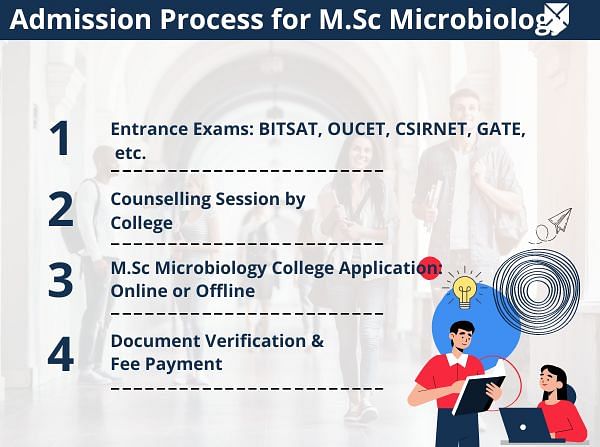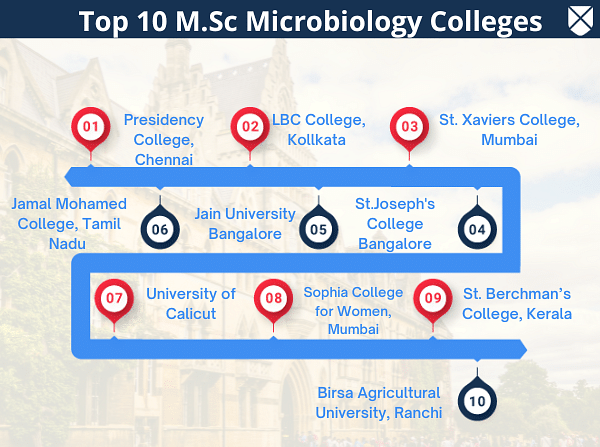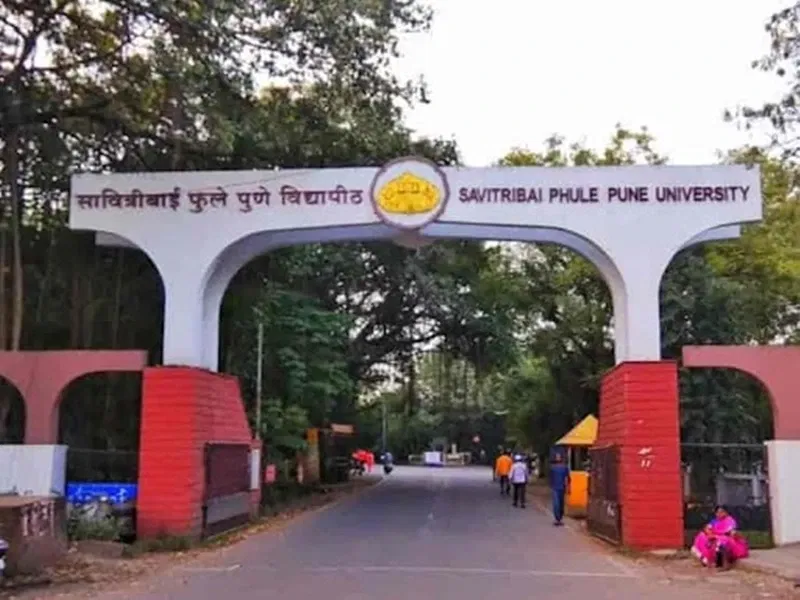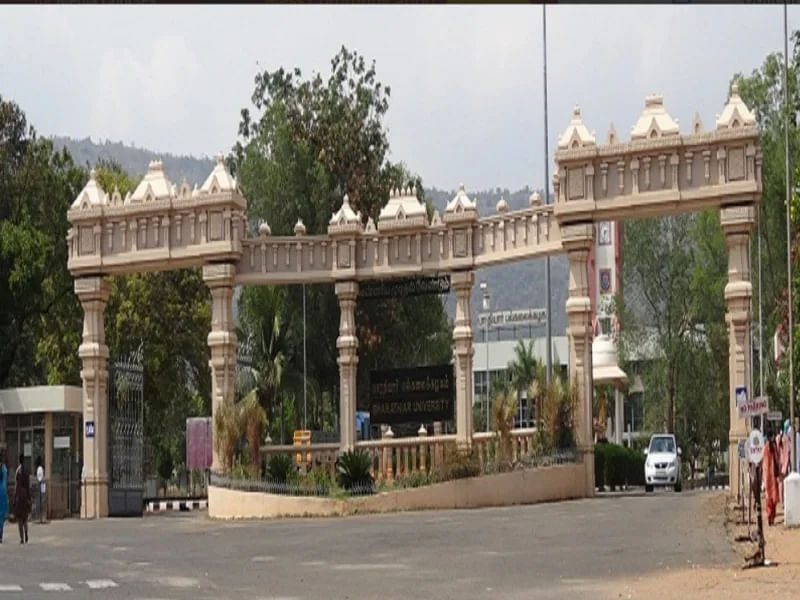M.Sc Microbiology
M.Sc Microbiology is a 2-year postgraduate course that deals with specialized study about the several functions of living organisms and their relation to the environment. Students get to study the core functional areas of micronisms and behaviors of microbes such as viruses, bacteria, fungi, algae, etc. Graduates can find a variety of job opportunities after completing M.Sc Microbiology such as Quality Control Executive, Associate Researcher, Academic Lecturer, Microbiological Auditor, Lab Technician, and Clinical Executive.
Table of Contents
- About M.Sc Microbiology
- Eligibility Criteria for M.Sc Microbiology
- Who Should Pursue M.Sc Microbiology Course?
- How to Get Admission to M.Sc Microbiology?
- Popular Entrance Exams for M.Sc Microbiology
- Top 10 M.Sc Microbiology Colleges
- Fee Structure for M.Sc Microbiology
- Syllabus and Subjects for M.Sc Microbiology
- Why Choose M.Sc Microbiology?
- Preparation Tips for M.Sc Microbiology
- Scope for Higher Education
- Salary of an M.Sc Microbiology Graduate
- Career Options After M.Sc Microbiology
- Skills That Make You the Best M.Sc Microbiology Graduate
M.Sc Microbiology Course Details
| Degree | Masters |
| Full Form | Master of Science in Microbiology |
| Duration | 2 Years |
| Age | No age limit |
| Subjects Required | Subjects corresponding to post-graduate. |
| Minimum Percentage | 55% |
| Average Fees | ₹30K - 1 LPA |
| Average Salary | INR 4.4 LPA (Source: Payscale) |
| Employment Roles | Lecturer, Microbiologist, Research Officer, Assistant Professor, Chief Hygienist, Executive/Sr. Executive, Demonstrator, Microbiology Lab Technician, Quality Control Executive etc |
| Top Recruiters | Zydus Cadila, Accenture, Cipla Inc., Roche Diagnostics Corporation, Quintiles Inc., Sciformix, Emcure, Cognizant, Syngene etc |
About M.Sc Microbiology
M.Sc Microbiology is a 2-year long postgraduate course specializing in the various tenets of chemistry and biology with specializations in a variety of research areas such as virology, immunology, microbial physiology, bio instrumentation, microbial diversity, etc.
The M.Sc Microbiology syllabus focuses to equip students with practical knowledge of current development and also imparts them with theoretical knowledge. M.Sc Microbiology job scope is extensive ranging from clinical reviewer to data analyst in both public and private sectors.
Eligibility Criteria for M.Sc Microbiology
The basic M.Sc Microbiology eligibility criteria are passing the B.Sc degree with a minimum of 50% marks from a recognized institute. Students must also have had core subjects related to the field of microbiology. Apart from merit-based eligibility, certain M.Sc microbiology colleges conduct entrance exams such as GATE, BITSAT, OUCET, etc. There is no minimum age limit for applying for the M.Sc Microbiology duration.
Who Should Pursue M.Sc Microbiology Course?
M.Sc Microbiology course designed for students who want to get into microbiology pertaining to an interdisciplinary approach consisting of both chemistry and biology, with analytical and logical thinking skills.
Students who have a bachelor of science degree in the fields of Botany, Zoology, Chemistry, Physiology, and Microbiology can pursue this course.
When To Do M.Sc Microbiology Course?
If a student wants to pursue a career in a science-related field, he or she should complete graduation from a recognized university with a minimum of 50% or above marks.
How to Get Admission to M.Sc Microbiology?
Admissions for the course duration can be based in two ways, either through merit or entrance exams. Applications for the M.Sc Microbiology admission process may be availed by logging in to the college portal or directly visiting the college admissions office.

Listed below are the details of the admission process in general:
How to Apply?
Students can apply for the admission process through both the offline and the online modes. For the offline admission process, students must visit the college admissions office, collect the application form, submit the details and make the registration payment. Regarding the online procedure, students need to log in to the college portal, fill in the details on the application form and make the registration payment online.
Selection Process
The selection process for M.Sc in Microbiology in India can be merit-based, where students have to meet the basic eligibility of passing the B.Sc degree with a minimum of 50% marks from a recognized institute. For certain M.Sc Microbiology colleges in India, admissions for the course are strictly offered to candidates who secure a sound performance in the entrance exams such as GATE, CSIR NET, etc.
Popular Entrance Exams for M.Sc Microbiology
The best M.Sc Microbiology colleges in India conduct entrance exams so as to ensure they select the best suitable candidates for the course duration. Mentioned below are some of the popular entrance exams conducted by the best colleges in India for M.Sc Microbiology:
A Quick Glance at the M.Sc Microbiology Entrance Exams
The top M.Sc Microbiology colleges in India conduct an entrance exam process for selecting the best candidates with core knowledge of the subject along with possessing the desired aptitude. The general entrance exam pattern for M.Sc in Microbiology is mentioned below:
- The duration of the exam is 180 mins
- The total number of questions asked is 150
- It is a computer-based exam
- The question paper is structured in an MCQ pattern
- Every correct attempt carries 3 marks
- 1 mark will be deducted for each incorrect answer
Top 10 M.Sc Microbiology Colleges
The top M.Sc Microbiology colleges in India offer the best training to the students for meeting the various industrial demands. Mentioned below are the top 10 colleges for M.Sc Microbiology in India:
|
Sl. No. |
Name of the Institute |
|
1. |
|
|
2. |
|
|
3. |
|
|
4. |
|
|
5. |
|
|
6. |
|
|
7. |
|
|
8. |
|
|
9. |
|
|
10. |

Fee Structure for M.Sc Microbiology
The fee structure of an M.Sc Microbiology college in India depends on several underlying factors. Some of the governing tenets that influence the fee structure of M.Sc Microbiology top colleges in India are infrastructure, institutional facilities, faculty, lab facilities, teaching methods, and placement opportunities. The average fee structure for an M.Sc Microbiology specialization ranges from INR 30,000 - 1 LPA.
Listed below are the M.Sc Microbiology course fees for various colleges:
|
Sl. No. |
Name of the Institute |
Total Fee Structure |
|
1. |
GS Medical College, Mumbai |
INR 68,000 PA |
|
2. |
Kurukshetra University, Kurukshetra |
INR 1 LPA |
|
3. |
Kalinga University, Raipur |
INR 76,000 PA |
|
4. |
Madhav University, Sirohi |
INR 31,000 PA |
|
5. |
Kristu Jayanti College, Bengaluru |
INR 80,000 PA |
|
6. |
KAHE, Coimbatore |
INR 54,000 PA |
Syllabus and Subjects for M.Sc Microbiology
The syllabus for M.Sc Microbiology is curated in a manner to incorporate all the important concepts in the field of microbiology. After the completion of an M.Sc in Microbiology, students can obtain jobs in several roles such as Academic Lecturer, Researcher, Microbiologist, Lab Technician, etc. Mentioned below are some of the core subjects in the Masters in Microbiology syllabus:
- Virology
- Enzymology
- Microbial Genetics
- Immunology
- Bioinformatics
- Microbial Physiology
- Bioinstrumentation
- Bioprocess Engineering
Read More: M.Sc Microbiology Syllabus and Subjects
Why Choose M.Sc Microbiology?
Microbiology itself being an interdisciplinary approach to academia fosters a diverse range of opportunities for students. To understand ‘What is M.Sc Microbiology?’ and ‘Why Choose M.Sc Microbiology?’ better, we need to answer the following three questions:

What Does an M.Sc Microbiology Graduate do?
After the completion of an M.Sc in Microbiology, a variety of career designations are available for the students of the course. Due to the interdisciplinary approach of the subject, graduates are well-equipped to handle the professional challenges of industries pertaining to both biology and chemistry.
Microbiologist: The role of a microbiologist includes investigating, analyzing, and researching the microscopic tenets of a living organism by collecting sample data from a variety of sources and developing new research findings to enhance medical research. Microbiologists also play a key role in helping develop new medicines and vaccines to tackle new forms of viral transmissions.
Reasons why M.Sc Can Fetch You a Rewarding Career?
M.Sc Microbiology paves way for a lucrative career with great scope for career growth. The field of microbiology is one of the primary fields in medical research that always offer the potential for newer breakthroughs.
Diversity of the job sector: Microbiology M.Sc paves way for a career with a pool of opportunities in a varying range of sectors. Both biology and chemistry have a wide range of sectors under their helm. M.Sc in Microbiology allows the candidate to develop an interdisciplinary approach and apply to a wide range of sectors with adequate qualifications.
Read More: M.Sc Microbiology Jobs and Scope
Preparation Tips for M.Sc Microbiology
M.Sc Microbiology demands tedious preparation from the aspiring candidates. Mentioned below are some of the preparation tips for the M.Sc in Microbiology syllabus:
Regular Practice: Practicing regularly all the core concepts throughout the course duration enables a full-fledged understanding of the course.
Study About The Course: Candidates for the course need to study the course tenets in great detail to ensure timely preparation.
Attend Workshops and Seminars: Students of the course should attend workshops and seminars not only from their institutions but in other spaces as well. This helps in developing a pragmatic attitude toward the concepts and tenets.
Scope for Higher Education
Career opportunities are diverse after the completion of a Masters in Microbiology. Mentioned below are some of the higher educational opportunities after M.Sc Microbiology:
Salary of an M.Sc Microbiology Graduate
Microbiology is one of the most sought-after avenues in the field of science and research. The interdisciplinary approach of the course makes it a lucrative paying job with a starting salary of INR 4.4 LPA on average (Source: Payscale).
M.Sc Microbiology candidates can opt for higher education to polish their skills further. This ensures a higher starting salary upon joining the professional industry.
Read More: M.Sc Microbiology Salary
Career Options After M.Sc Microbiology
Career options after M.Sc Microbiology are available to graduates in a variety of fields and organizations. Some of the fields that offer jobs to graduates of Masters in Microbiology include research centers, academic institutions, research labs, agricultural research, biotechnological research, medical companies, etc. Mentioned below are some of the job roles available to graduates after an M.Sc in Microbiology:
- Microbiologist
- Copy Editor
- Medical Coder
- Medical Writer
- Project Assistant
- Lecturer
- Associate Researcher
- Lab Technician
- Assistant Professor
- Quality Assurance Manager
Skills That Make You the Best M.Sc Microbiology Graduate
Academic reading becomes an essential feature of a lengthy syllabus such as the M.Sc Microbiology course. However, in order to excel in the field of microbiology, students are required to possess a certain set of skills to stand out from the rest. Listed below are some of the skills that help one to excel in the field of microbiology:
- Research Skills
- Analytical Skills
- Leadership
- Communication Skills
- Listening Skills
- Attention to Detail
- IT skills
- Numerical Skills
- Interpersonal Skills
Top M.Sc Microbiology Colleges
Top Science Entrance Exams
M.Sc Microbiology Fee Structure
FAQs on M.Sc Microbiology
Q: What is the scope of MSc microbiology?
Q: What are the subjects in MSc microbiology?
Q: What is the salary after MSc Microbiology?
Q: What is the eligibility for MSc Microbiology?
Q: What art the jobs after MSc Microbiology?
























